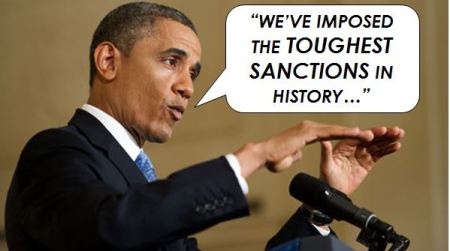
Another loophole has materialized in Pres. Obama’s “toughest sanctions ever.” Not that it really matters when we’re offering $20 to $50 billion in sanctions relief anyway if Iran agrees to scale back on its nuclear program somewhat.
By the way, if bitcoin can help businesses in Iran to skirt international sanctions, can’t bitcoin help Hezbollah as well?
From CoinDesk on Nov. 5:
Bitcoin helps Iranian shoe store overcome international trade sanctions
Jon Southurst
An interesting e-commerce site that went online just last week is accepting bitcoin only, because most overseas customers cannot pay with anything else.
The business is Persian Shoes, an over 70-year-old business selling handmade footwear. It is located in Isfahan, the third-largest city in Iran.
The owners are happy to ship anywhere, but paying them is a problem. Thanks to the vagaries of international diplomacy and the past few decades of history, the usual e-commerce channels are blocked.
Trade sanctions against the entire country of Iran by the United Nations, United States, European Union and others mean Western Union and major credit card companies will not deal with Iranian businesses, even those in the fashion world.
The only way to pay someone in Iran is with cash carried in your pocket – or some easily transferrable, mostly unregulated, digital currency.
The bitcoin-only store sold four pairs of shoes in its first day of business. “To my standards it is a good sale!” said the CEO, Mor Roghani. The store’s success continued throughout its first week.
“We have sold ten pairs of shoes so far using bitcoin. This is way above our expectations,” he added.
Persian Shoes is currently operated by three brothers, who are keen to expand the business their father started. Roghani’s cousin, who lives in Australia, introduced them to bitcoin and helped them to set up the site.
The site currently offers leather handbags, purses and shoes for women and seven varieties of shoes for men. Prices are all listed in USD and start around US $80.
Its FAQ page explains bitcoin and guides new users to online services like Coinbase, Bitstamp and BitBargain, as well as LocalBitcoins. It also explains the trade situation:
Our business is making and selling leather products. We like to sell our products across the world and the more customers the better. The problem is we operate in Iran and most payment systems either are not willing to serve us at all or impose a huge risk on our business. Before launching this website, our international sale has been limited to a few dedicated customers who knew about the quality of our products and were prepared to go through a lot of trouble to pay us! This of course, may sound incomprehensible for people who have all sorts of electronic payments at their disposal. However, before finding out about bitcoin, receiving our money was the number one obstacle in expanding our business.As well as international trade restrictions, exchanging bitcoin back into local currency (Iranian Rials) also faces knowledge and technical barriers.
“Exchange is a bit tricky because bitcoin is not common yet. We are planing to hold onto some of the bitcoins and sell some at localbitcoins,” Roghani said. A lack of online shopping culture locally and poor internet connectivity hinders trade with other parts of Iran.
Depending on your country of citizenship or residence, you may not actually be allowed to buy these shoes even with bitcoin. Just as Americans may not spend a weekend in Havana or enjoy real Cuban cigars, they are also forbidden to engage in any trade activity with businesses or individuals located in Iran.
Despite this, Persian Shoes has taken orders from customers in the US and is waiting to see how smoothly the deliveries go before advertising the business more widely (update: all US orders have reached their destinations so far without problems.)
A query sent to United States Customs and Border Protection (part of the Department of Homeland Security) asking specifically about private e-commerce transactions for items of clothing received the following response: “Unfortunately, sanctions against Iran prohibit this”…

No comments:
Post a Comment